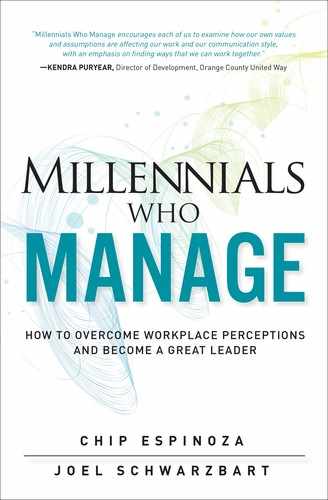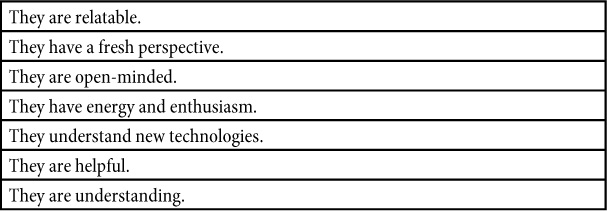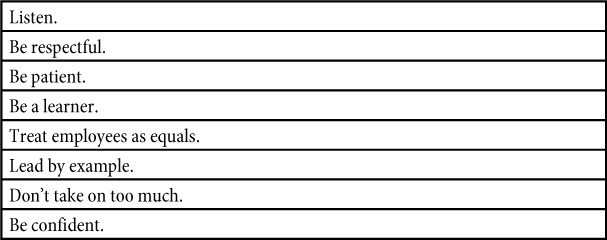2. Making the Transition into Management
While doing research for this book, we surveyed and interviewed Millennial managers in an attempt to identify difficulties they may have encountered while transitioning into management. We think their experience may be helpful to you on a couple of levels. First, the information will help you not feel alone if you have had similar experiences. Second, we can make you aware of what to anticipate about making the transition.
Not unlike transitioning from college to career, transitioning into management can be accompanied by a sense of loss—a loss of freedom and a loss of familiarity. There is something to be said for not having responsibility for others and for being able to blend into the fabric with friends. It is much more fun to critique than to be critiqued.
It is important to acknowledge the emotional components to making a transition. There are highs associated with achieving what you have been pursuing, but at the same time, you know you are leaving something behind. Christine Hassler refers to getting the blahs after achieving something you have always wanted to achieve as Expectation Hangover.1
Before sharing all the results of the survey, we’ll share one bit of information: None of the respondents said that they wanted to forfeit their position and go back to the way things were pre-promotion.
Welcome to Management
In the survey, we asked, “What was the most difficult thing about transitioning into management?” In Table 2.1, we list the difficulties in order of frequency of response.
We want to draw attention to the items not being taken seriously and getting people to listen. You will see that the same labels show up in Table 9.4 in Chapter 9, “Managing Millennials.” However, the reported challenges in Chapter 9 have to do with gaining the acceptance and respect of older workers. If you read the verbatim comments in the survey, not being taken seriously and getting people to listen are frustrations they have with older workers, peers, and younger workers. Feeling the pain? Millennials who manage have to struggle with getting respect from both ends of the age cohort spectrum.
In addition to asking Millennial managers about the challenges of transitioning into management, we also wanted to know how people experienced being managed by a Millennial. Again, our focus was to identify specific areas of development for our readers. We asked for the upside and the downside of being managed by a Millennial and what advice they would give a Millennial manager. The results along with verbatim comments are listed below.
What Do You See as Positive About Being Managed by Someone Under 35?
Table 2.2 shows the responses of respondents under and over 35 years of age to the question “What do you see as positive about being managed by someone under 35?” You will be able to see shortly some of the verbatim comments we received. In general, workers under 35 highly value Millennials’ ability to relate, be helpful, be open-minded, and be understanding. Employees over 35 appreciated their energy, enthusiasm, open-mindedness, fresh perspective, and understanding of new technologies.
Again, you will see similar labels show up in Chapter 9, this time in Table 9.6. It is obvious that Millennials trust these strengths and continue to build on them.
Here are a few verbatim remarks we got to this question:
“Generally, the younger management tends to be less focused on micromanagement, and more focused on team building.”
“The person will probably have a different perspective and approach than an older manager and may know more about recent developments and newer techniques or technologies.”
“They are more open minded and willing to change.”
“They are more ‘with the times’ and can relate to using technology that can make work easier and more efficient.”
“They don’t think you’re stupid just because of your age or inexperience, at least they give you a shot to PROVE that you can do the job (or prove that you are stupid). They can explain things a little easier—training always goes smoother because they tend to understand what they are teaching instead of just reading out of a book.”
“Currently, they are a breath of fresh air and much more trusting of all members in our group, who are adults with a lot of knowledge and experience. The previous manager of my current workgroup was approximately the same age, but was a micro-manager.”
“It feels less formal. I can speak in my own vernacular and it gets across (and vice versa). My manager being close in age also means that she can identify with what I’m experiencing in my own career development more than older managers would be.”
“The positive about being managed by someone under 35 is their attitude and fresh perspective.”
“Energy, enthusiasm, energy, enthusiasm, energy, enthusiasm...to the 10th power.”
What Do You See as the Downside About Being Managed by Someone Under 35?
We know the answers to this question will not be news to you. As shown in Table 2.3, the number-one challenge Millennials face when entering the workforce is lack of experience (see Table 9.4 in Chapter 9). The lack of experience response may be a result of stereotyping and, if it were weighted, you would see that it is the opinion of most workers over 35 years old.
Here are a few (we’ll spare you the repetition) verbatim remarks we received in response to this question:
“They feel like they know everything but don’t have the real experience.”
“My boss is smart but immature.”
“They have underdeveloped people skills.”
“She doesn’t seem to be able to follow through on anything.”
“My boss is more concerned about his next position than the one he is in now.”
The good news is that at this stage of your career, you are gaining valuable experience, learning from the experience of others, and understanding how to position yourself in the organization.
Experience is important, but it isn’t always the greatest strength. Liz Wiseman, in her book Rookie Smarts, offers an interesting perspective on experience: “Sometimes the more you know, the less you learn. Too often experience can blind us to new possibilities and put us on the defensive. When we feel we already know what needs to be done, we are unwilling to coordinate our efforts with others or to accept outside input.”2
What Management Advice Would You Give to a Manager Who Is Under 35?
The advice we got in response to this question (see Table 2.4) reflects what you would read on the flipchart at almost any training event for managerial leaders. You know the qualities you appreciate in the people who manage you. But what keeps us from being the leaders we want to follow? Where is the breakdown? It is not a question we want to answer for you. We want you to answer it for yourself. Your greatness is dependent upon it.
Here are some verbatim remarks we received in answer to this question:
“Listen to those that are older than you; they may know about certain things that you don’t and you can learn from each other.”
“Be kind. Be a real person. No bull#*&@. Just be yourself.”
“Learn the difference between being a boss and being a manager...a boss tends to micromanage, a manager leads by example and contributes to the workload.”
“Slow down. Work smarter, not harder; and treat your people the way you want to be treated to earn respect.”
“Listen to what your employees have to say and take their opinions seriously.”
“Be confident but respectful of all workers regardless of age.”
The complexity of managing as a Millennial is captured by the last piece of advice—be confident. It is not an easy feat when you are perceived as inexperienced or immature. Confidence is the combination of self-efficacy and self-esteem. Self-efficacy is the belief that you are competent and that you have the tools to do the job. Self-esteem is the emotional evaluation of your own worth resulting in an attitude toward your self. Healthy self-esteem is evidenced by having the sense that you can cope with the challenges you will face and that you are worthy of the respect of others. Self-esteem without competency can lead to hubris (excessive pride or arrogance). The great news is that self-confidence can be built, and you are the one in charge. Sure, there is the outside influence of many different voices—some affirming and others not so much. In the next few chapters, we will help you better understand those voices. But more importantly, you will become more comfortable with your own.
In the next chapter, we will focus on the first step toward leadership greatness: developing your own leadership perspective.
Endnotes
1. Hassler, C. (2008). 20 something manifesto: Quarter-lifers speak out about who they are, what they want, and how to get it. Navato, CA: New World Library.
2. Wiseman, L. (2014). Rookie smarts: Why learning beats knowing in the new game of work. New York: HarperCollins, p. 24.




